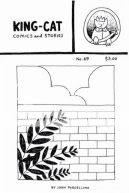King-Cat Comics and Stories #69
John Porcellino, writer/artist
Spit and a Half, September 2008
28 pages
$3
In the right hands, comics don’t depict, they convey. This is the advantage they have over their cousin film. The basic stuff of film (putting aside animation and abstract filmmaking and CGI for the moment) is, on a fundamental level, the recording of things that actually happened in front of the camera recording them. Those recordings can be recordings of a fiction, and they can be used to construct a fiction, and directors and cinematographers and editors and composers and effects technicians can add their interpretive gestures, but film is nevertheless a hegemony of fact. Comics, by contrast, is all middleman. Even an autobiographical comic is by virtue of being a comic not showing you something that happened, but telling you about it, the telling coded directly into the line of the artwork. It’s a gestural art form, a mime medium.
No one gets that better than John Porcellino. Most lo-fi autobio cartoonists, perhaps paradoxically, aim for maximalist effect in terms of presenting the artist’s self-conception: shaky, rough-hewn lines, clumsy character designs, everything designed to get across “I’m self-effacing!” Porcellino stays out of his own way. With his smooth uniform line weight, characterized by elegant curves and semicircles, he presents information on a need-to-know basis, usually emphasizing human figures against a minimally depicted background (like a sky) or foreground (like a car window). He’s not conveying a pose, he’s conveying in-the-moment relationships: Between himself and his wife, between his two cats, between himself and a parking lot, between the grass and the sky. This happened, yes, but he allows you to draw the conclusion yourself–this is how it happened, this is how it felt in that moment. All that empty space allows you to place yourself between those lines. The effect is immediate, immersive, and evocative, so that when the poetic writing really hits–especially those frequently powerfully sad final lines–you can all but feel that world’s weight around you.
Tags: comics, comics reviews, Comics Time, reviews

